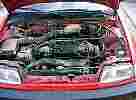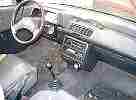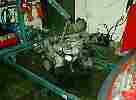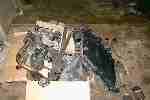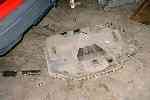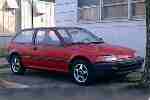
|
This is the basic beginnings of a webpage relating
the conversion of my '88 Honda Civic into an electric car. Like the
webpage, the conversion hasn't gone quite as planned. It has evolved
continuously throughout the project, and continues to do so today.
The original idea looked like this:
-
Motor:
a used 9" GE series wound
-
Controller:
a used Curtis 1221B 120 volt 400 amp
-
Batteries:
10 used group 31 Johnson Controls Dynasty UPS batteries.
-
Charger:
a K&W BC-20 charger with LB-20 line booster. 120 VAC input.
-
Voltage:
120 volt system.
-
DC/DC Converter: Todd PC/LV-40
What I had planned on was basically stripping my old Jet 007 back down
to the original specs, and using some parts I had scrounged up. So
much for plans. It didn't turn out anything like that. Instead
it specs out like this:
-
Motor:
8" Advanced DC 203-06-4001
-
Controller:
Auburn Kodiak WC-600
-
Batteries:
13 Dynasty 12 volt AGMs
-
Chargers:
Zivan NG5, 220 VAC input, modified "Fair Radio" 120 VAC input
-
Voltage:
156 volt system
-
DC/DC Converter: Todd PC-30
The car itself is a base model 1988 Honda Civic hatchback, that originally
had a 1.5 liter engine and a 4 speed manual transmission. I found
in sitting on bald flat tires in the back of a used car lot.
The sign on the windshield said "bad valve? $800" , but they took $400.
That was in February of '99 and it looked pretty much as you see on the
left, kind of nasty. I did actually get it running, but it was one
very sick puppy. I was hoping the engine would be good enough to
sell, but it was scrap.
I started tearing it apart on February, 24th, 1999. The loan of
a very nice engine hoist by a fellow EV club member made pulling the engine
fairly easy. As the car came apart I found a number of things that
needed fixing. Among them, both front CV joints were ruined, the
transmission had bolts broken off in it, the front motor mount was basically
gone, and the brakes were toast. Instead of just fixing everything,
I decided to make upgrades where possible. Among these were:
-
'91 Honda Civic EX front spindles. calipers, rotors, and master cylinder.
These are the largest available Honda brakes that will directly bolt onto
this chassis. This did require different axle shafts, but as I needed
these anyway it wasn't a real problem. The EX uses the same rear
brakes as the other Civics, so these were not changed, just overhauled.
-
'90 Acura Integra front springs on new Civic struts. This helped
compensate for the added weight of the batteries.
-
'91 Civic Si rear lower control arms and struts. I fitted the struts
with Prelude springs to support the additional weight of the rear batteries.
I wanted the lower control arms, so I could have the rear stabilizer bar,
and because the '89-91 control arms are forged, rather than the lighter
stamped units used in '88.
-
'90 Civic LX front stabilizer bar, and '91 Civic Si rear stabilizer bar.
My Civic was a base model with no stabilizer bars at all, so this made
a huge difference.
-
'88 Civic DX 5 speed transmission. It was far easier and cheaper
to replace the whole transmission than to try to drill out the broken bolts
and re-tap them. It also gave me an extra gear if I needed it.
-
'90 Civic LX instrument cluster. These have a tachometer, and that
was one feature I wanted on my EV. It can be difficult to determine
motor rpm when you have a virtually silent motor.
Tearing the Civic down went rather quickly. I think I had all the
ICE parts out in the first week. The trick is to label everything
as you disassemble, and cut as little as possible. It is very annoying
to realize the wiring you just cut through is one you should have kept.
I bought a Helms manual, the same one Honda uses, and never regretted it.
It makes the Chilton's and Hayes manuals look like jokes. If you
going to do a conversion, buy the real manual. |


